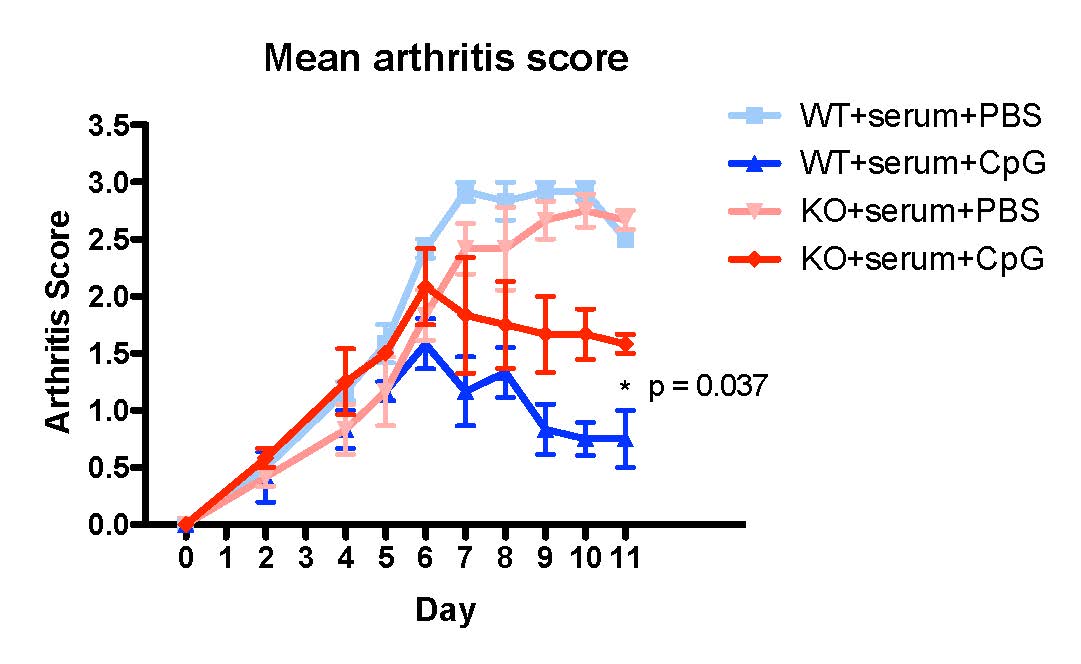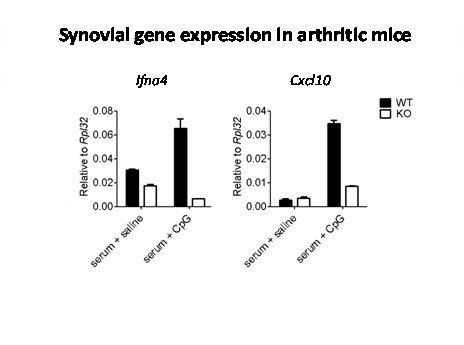Session Information
Session Type: Abstract Submissions (ACR)
Background/Purpose: Rheumatoid arthritis (RA) synovial fluid exhibits high levels of type 1 interferons (IFN). Type 1 IFN may exert potent anti-inflammatory effects, since a TLR3 agonist suppresses inflammatory arthritis in a type 1 IFN-dependent manner. PTPN22, encoding Lymphoid Tyrosine Phosphatase (Lyp), is a “risk” gene for RA. A PTPN22 disease-associated variant encodes an R620W substitution-bearing protein “LypW”. We showed previously that PTPN22 promotes Toll-like receptor (TLR) signaling and type 1 IFN production. Further, we found that LypW exhibits reduced function in poly(I:C)-mediated suppression of inflammatory arthritis in the K/BxN “serum-transfer” arthritis model. TLR9 agonists can also suppress arthritis through an unknown mechanism. We tested the hypothesis that PTPN22 is required for TLR9 agonist-driven amelioration of arthritis.
Methods: Serum-transfer arthritis was induced in control or Ptpn22-/- mice by intraperitoneal injection of K/BxN mouse serum. Mice were then injected with ODN 1668 (10 nmol), a CpG oligonucleotide agonist of TLR9. Arthritis scores were monitored. Synovial RNA was assayed for type 1 interferon and interferon-dependent gene expression via RT-qPCR.
Results: Confirming previous reports, ODN 1668 treatment ameliorated serum-transfer arthritis in control mice. However, Ptpn22-/- mice exhibited diminished suppressive response to ODN 1668. Reduced arthritis amelioration in Ptpn22-/- mice correlated with impaired TLR9 induction of Ifna4 and Cxcl10 (type 1 IFN-dependent chemokines) in synovium (Figure 1).
Figure 1: Mice (n = 3 per group) were injected with K/BxN serum together with ODN 1668 or vehicle alone. Arthritis severity scores (mean± SEM) are shown. WT, wild-type; KO, Ptpn22-/-.
Figure 2: Expression of Ifna4 and the IFN-inducible gene Cxcl10 in synovium at day 11 post injection of serum was determined by qPCR.
Conclusion: Ptpn22 is required for CpG-induced amelioration of inflammatory arthritis, and for upregulation of type 1 IFN-dependent genes in synovium. These data support a model wherein Ptpn22 exerts anti-inflammatory effects by promoting TLR signals that induce type 1 IFN and type I IFN-dependent genes.
Disclosure:
D. Ewart,
None;
E. J. Peterson,
None;
Y. Wang,
None.
« Back to 2014 ACR/ARHP Annual Meeting
ACR Meeting Abstracts - https://acrabstracts.org/abstract/ptpn22-promotes-tlr-induced-amelioration-of-arthritis/


